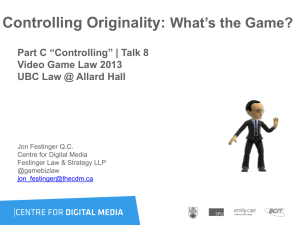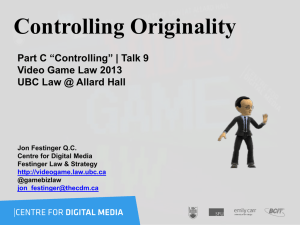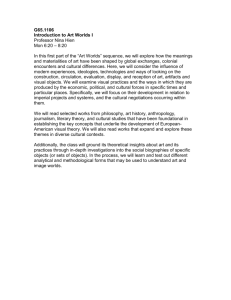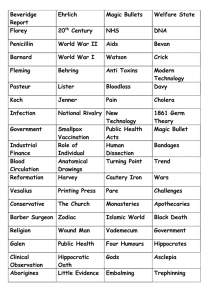in-game - Video Game Law
advertisement
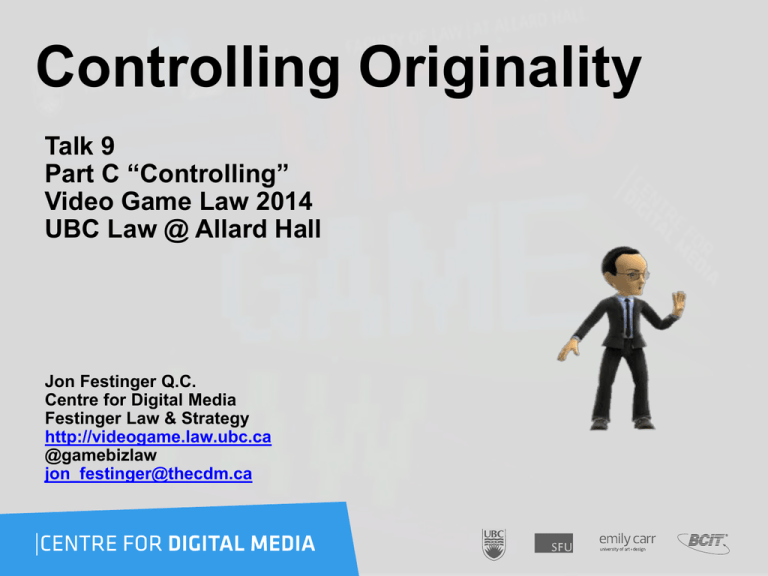
Controlling Originality Talk 9 Part C “Controlling” Video Game Law 2014 UBC Law @ Allard Hall Jon Festinger Q.C. Centre for Digital Media Festinger Law & Strategy http://videogame.law.ubc.ca @gamebizlaw jon_festinger@thecdm.ca Video Game Law 1st Edition Wiki Update Project Oculus Update F.A.Q Coming Follow Up: The Big Question Something super weird… Or totally obvious? All the World is a Game “ARE YOU LIVING IN A COMPUTER SIMULATION?” Nick Bostrom – Faculty of Philosophy, Oxford University. http://www.simulationargument.com/simulation.html “Physicists devise test to see if we're living in 'The Matrix” http://www.theverge.com/2012/10/11/3487710/computer-simulation-silasbeane-university-bonn Is this a video game? “…the process of creating a model of the world using multiple feedback loops in various parameters (e.g., in temperature, space, time, and in relation to others), in order to accomplish a goal (e.g., find mates, food, shelter).” NO, IT IS YOU “Consciousness is the process of creating a model of the world using multiple feedback loops in various parameters (e.g., in temperature, space, time, and in relation to others), in order to accomplish a goal (e.g., find mates, food, shelter).” Could it be..? …That Kaku’s definition of Consciousness aligns so well with video games, because Bostrom is right; we are in a video game. https://medium.com/message/the-secret-of-minecraft-97dfacb05a3c “A generative, networked system laced throughout with secrets.” http://youtu.be/z8iEogscUl8 Is this why we are so obsessed with pursuing confusion between what is virtual and what is real? The Game of Life Have we turned life into a game(gamification)? *ARG’s e.g. EA’s 2001game “Majestic”: tagline = “It Plays You”; by phone, email, instant messaging, fax, and dedicated websites. * Film Meme: “Inside the Game” Tron (1982) & Tron Legacy (2010); Wargames (1983); eXistenZ (1999); The Thirteenth Floor (1999); The Matrix (1999); Avalon (2001); Gamer (2009); Surrogates (2009); Wreck-It-Ralph (2012). The evolving video game ? Real-world “play” (“Ingress” – Capture the Flag mechanic) + Immersive control mechanism (Google Glass) + Anywhere/any device capability (the “cloud”) + “Open World” design (literally & Google Earth) + Tools/weapons (AR Drone Quadra Copter; Google Car) IS THIS REALLY A GAME? + If you want to go all the way… http://www.dailymail.co.uk/sciencetech/article-2522482/Is-universe-hologram-Physicists-believe-live-projection.html Remember Causation or Correlation? But even if not… Even if conventional explanation… Do you remember this question? WHY? “Equally strange is our general addiction to games, both physical and mental. The profusion of games is truly startling: card games, board games, word games, ball games, electronic games….We even assemble in huge crowds to watch others playing games. What does all this mean? Do we simply get easily bored and cannot tolerate inactivity? I can find nothing in the literature of scientific psychology that helps me to understand such bizarre behavior.” The Human Legacy (1982) Leon Festinger Perhaps we can answer that… at least How we are conscious & how we (video) game appear to be profoundly aligned. Exhibit 1: Jung on Games & Instinct “One of the most difficult tasks men can perform, however much others may despise it, is the invention of good games and it cannot be done by men out of touch with their instinctive selves.” Jung and the Story of Our Time, Laurens van der Post (1977) Exhibit 2: Play as Evolution Does Gaming have an evolutionary purpose in the Darwinian sense? • Dr. Kimberly Voll (CDM/UBC) – From “Game Design” – DMED 521: • 1. “neurons that fire together, wire together” (Donald Hebb, aka “Hebbian Learning”) • 2. “..so “fun” seems to be something our brains use to keep us doing something to the point of mastery…makes sense if it is something that will help us live better and get our genes out into the gene pool again…” Exhibit 3: McLuhan, 1964 (Games as social reaction) Games are popular art, collective, social reactions to the main drive or action of any culture. Games, like institutions, are extensions of social man and the body politic, as technologies are extensions of the animal organism. Both games and technologies are counter-irritants or ways of adjusting to the stress of the specialized actions that occur in any social group. As extensions of the popular response to the workaday stress, games become faithful models of a culture. They incorporate both the action and the reaction of whole populations in a single dynamic image. Exhibit 4: UTION GAMING AS A DARWINIAN EVOL “The role of self image in video game play” James Madigan (Gamasutra Feb. 3, 2012) http://www.gamasutra.com/view/news/40093 The_role_of_self_image_in_video_game_play.php “In the article, Andrew Przybylski...and his coauthors hypothesize that we’re motivated to play video games to the extent that they allow us to sample our “ideal self characteristics,” especially when there’s a large gap between our ideal selves and who we actually think we are. This could help explain why people are attracted to games in a way that’s unique to the medium.” Przybylski, A. K., Weinstein, N., Murayama, K., Lynch, M. F., & Ryan, R. M. (2012). The ideal self at play: The appeal of videogames that let you be all you can be. Psychological Science, 23, 69-76. http://pss.sagepub.com/content/23/1/69.full.pdf+html So Who Are We (in-game) A? “But games, designed to let us act as some fantasy of ourselves, don’t often ask us to think about what someone else “would” do. That players have choices is considered one of the medium’s exciting traits, but I always struggled a little bit to connect to games that have that kind of openness—am I playing a character, or am I being me?” http://www.vice.com/read/leigh-alexander-understanding-video-games-column-destiny-105 So Who Are We (in-game) B? http://www.theguardian.com/technology/2014/apr/24/the-identity-paradox-why-game-characters-are-not-but-should-be So Who Are We (in-game) C? Exhibit 5: Boyden “In all of these situations, the owners of a copyright in a form, description, or set of instructions were attempting to extend their copyright to material for which the user of the work provided the essential content, not its author. That is what made them systems. They were, without that input, empty shells, waiting to be filled.” “Games are systems in exactly the same way. A game, as sold, is only a game form; the content necessary for an instance of the game comes from the players. That is, the game form establishes the environment for play—the game space—and it defines permissible moves and the conditions for winning or drawing. But the game itself is supplied by the players.” “Systems are shells into which users pour meaning. While they may contain expression themselves, that expression is there merely to facilitate the meaning added by the user.” Two phenomena we have (fairly) observed? 1.Alignment of human consciousness & video-game modalities; & 2.Identity/Immersion Effect (who am I really?) + One More… 3. Connection (community) All leading to (you guessed it)… Exhibit 6: Video-Games as Post-Structuralism "Structure, Sign, and Play in the Discourse of the Human Sciences” Jacques Derrida Structures as free-floating (or 'playing') sets of relationships. Structuralist discourses unfortunately hold on to a "center” which anchors the structure and “does not play”. http://hydra.humanities.uci.edu/Derrida/s ign-play.html From “Post-Structuralism and Videogames “Post-structuralism with respect to narratology can be said to focus on decentralization of the author and the replacement of them with the reader. What this means is that authorial intent is not the primary goal of a textual or narrative analysis of a work. Decentralizing the author allows the work to be open to new interpretations. The way a text is read by one person is not invalidated by another reading of it, but rather just another interpretation given a different situated perspective. So what does this mean for an individual reader and, more importantly, a videogame player?” Some legal concepts to consider if video-games are post-structuralist? 1. 2. 3. 4. 5. 6. 7. 8. 9. 10. Copyright (e.g. mods) Copyright as an author’s right Trademarks Patents RIGHT TO CREAtE ? Moral rights Contracts Browsewrap contracts Clickwrap contracts Privacy (e.g. gamer not system dictates) Accordingly… Is it too much to ask that law also align with the already aligned realities of: 1. human consciousness; 2. (video) game design; & 3. community interactions Preliminary Assessments If So 1. Copyright law does not seem to align. 2. Perhaps contract law (done properly) does align? Creativity/Connection IS More Important than Property! I Can Mod That was the unconventional analysis of why video-game creativity should not be controlled. Now on to the conventional analysis… “Part C. Controlling” begins Where we are… A.Creating Meme (Mods the theme) B.Connecting Meme (EULA’s the theme) C.Controlling Meme (“Chill” ? the theme) * Today first class of Controlling * Today: originality as a mechanism of legal enforcement (and double standard ?) Which Laws? Layers of Control 11. Internet Governance & Surveillance (International Law) 10. Criminal & Obscenity Laws. 9. Taxation/Currency/Gambling (regulatory; quasi-criminal law) 8. Misleading promises/advertising, physical or psychological harm, unfair competition/anti-trust (consumer protection) 7. Industry self regulation (delegated authority) & medium specific regulation (constitutional) Out of the Creation Norms -----------------------------------------------------------------------------------------------In the Creation (Magic Circle) Ethics (of Originality, Creativity & Expression) 6. Privacy, Defamation & Personality law (tort, IP) 5. EULA/ToS & Contracts (contractual, private) 4. Trademark, Patents & the IP Business 3. Copyright & Users Rights (statutory) 2. Technology (quasi extra-legal) 1. Community (extra-legal) Legal Constraints on Digital Creativity: Originalities & Behaviors First 6 layers concern what is “original” in the game. Final 5 concern limiting behaviors outside the game. The Really New & Difficult: What is next…(& 2 b controlled?) TELEPATHIC GAMING Truly Immersive Virtual Reality 1. Start With Occulus Rift or MS Illumiroom 2. Add Physical Player Response Measurements 3. Add Neurogaming 4. Add Brain to Brain Interfaces 5. Add Big Data 6. Add “Lifestream” 7. Add 3D Printing 8. Add Smart Remote Control Vehicles (Anki) 9. Add (virtual?) monetization 10.Wrap it all into Augmented Reality (Google Glass/real- world interface) MAIN ISSUES WILL BE PRIVACY PRIVACY (coming class 11) PRIVACY PRIVACY PRIVACY PRIVACY CONSUMER PROTECTION (DIGITAL MANIPULATION) – “Calo” & Can the Magic Circle EVEN SURVIVE? NO QUESTIO N IT’S SHR INKINg Remember The “Magic Circle” acts (in theory) as a fence keeping out real world laws The “Missing (Ironic) Link”? Were EULA & ToS originally considered the way to create community laws insulated from real – world laws? Reinforcing ‘the magic circle’… The “Magic Circle” “All play moves and has its being within a play-ground marked off beforehand either materially or ideally, deliberately or as a matter of course. Just as there is no formal difference between play and ritual, so the ‘consecrated spot’ cannot be formally distinguished from the play-ground. The arena, the card-table, the magic circle, the temple, the stage, the screen, the tennis court, the court of justice, etc. are all in form and function play-grounds, i.e. forbidden spots, isolated, hedged round, hallowed, within which special rules obtain. All are temporary worlds within the ordinary world, dedicated to the performance of an act apart.” Johan Huizinga (1872-1945) in “Homo Ludens: A Study of the Play-Element in Culture”. Applied to video games by Katie Salen & Eric Zimmerman in “Rules of Play: Game Design Fundamentals” (2003) The legalities of the “Magic Circle” 1 1. “The Laws of the Virtual Worlds” - Greg Lastowka & Dan Hunter (2003) http://papers.ssrn.com/sol3/papers.cfm?abstract_id=402860 “No doubt there will be time and litigation enough to soon make further observations. However there is one point that is worth making in conclusion. It is not going to be a sufficient answer, either for property or avatar rights, to say, “It’s just a game”. Nor can the company creating the world simply intone that the world is theirs to do with as they wish. The issues are more complex than that, and the users and community will have a say in the outcome of these questions…We will have to recognize that these are separate places, with a separate community, separate laws, and separate rights. Sometimes the inhabitants of these worlds will come down to our world, to have recourse to our law, and gain protections against their gods. But more and more they will live out their lives in a different world, and they will eventually come to create their own laws, just as they are building their own community. In time perhaps they won’t care what we think or what our laws say. They will live and love and law for themselves.” 2. “Virtual Liberty: Freedom to Design and Freedom to Play in Virtual Worlds” Jack Balkin (2004) http://papers.ssrn.com/sol3/papers.cfm?abstract_id=555683 “In the future, virtual worlds are likely to become important spaces for innovation and free expression. Properly drafted interration statutes can help promote these values. To this end, legislatures should prominently state the public values these statutes are designed to serve in the statutes themselves as guides to interpretation by courts, and courts, in turn, should interpret these statutes liberally to promote free speech values. We should view interration statutes as applications and extensions of the central values of individual creativity and democratic participation that we associate with the First Amendment.96 That is to say, we should view them as “First Amendment extension acts” appropriate for a digital world in which many of the most important spaces for creative expression are held in private hands.” 3. “The Right to Play” - Edward Castronova (2005) http://papers.ssrn.com/sol3/papers.cfm?abstract_id=733486 “A legal framework for make-believe places will not be very fun to create either. It will require numerous creditors, theft victims, tax collectors, protestors, defeated warriors and impoverished wizards to simply go home empty handed, unsatisfied, perhaps distraught. But it will allow everyone, all of us, to spend time in worlds where magic is real. Goodness, we haven’t done anything like that in hundreds of years. We miss it.” The legalities of the “Magic Circle” 2 4. “Virtual Property” - Joshua Fairfield (2005) http://papers.ssrn.com/sol3/papers.cfm?abstract_id=807966 “I propose a different answer: cyberspace is neither a bad analogy nor a metaphor. Cyberspace is a descriptive term. It describes the degree to which some kinds of code act like spaces or objects…And while the place and space language is routinely used by the courts and lawyers, again, legal academics have either supported the place metaphor as merely psychologically useful, or have completely rejected it as a bad analogy.” 5. “Virtual Borders: The Interdependence of Real and Virtual worlds” – James Grimmelmann (2006) http://papers.ssrn.com/sol3/papers.cfm?abstract_id=868824 “In the end, talking about the real-money trade points out the deep interdependence of the virtual and the real. It is possible only because of their interrelationship. If avatars in virtual worlds were not so profoundly linked to people in the real one, there would be no real-money trade. To the extent that the real-money trade is a problem, its solution also must recognize the interdependence of the real and the virtual.” 6. “The Magic Circle” - Joshua Fairfield (2008) http://papers.ssrn.com/sol3/papers.cfm?abstract_id=1304234 “The implications for the future of virtual worlds are complex. On one hand, denizens of virtual worlds should hope that the law that ultimately govern virtual worlds will not only take their interests into account in some sort of paternalistic fashion, but that courts will give the actual solutions worked out by online communities the force of law. On the other hand, players in virtual worlds should understand that their behavior online is not entirely free from real-world scrutiny. This is a bit saddening. It was wonderful to live in the cyber Wild West. But every new frontier has its civilizing moments. And virtual worlds are an enormous phenomenon, one that law cannot afford to ignore.” The “Magic Circle” exposed “As stated previously, players never play a new game or fail to bring outside knowledge about games and gameplay into their gaming situations. The event is ‘‘tainted’’ perhaps by prior knowledge. There is no innocent gaming…Players also have real lives, with real commitments, expectations, hopes, and desires. That is also brought into the game world, here Azeroth. We can neither ignore such realities nor retreat to structuralist definitions of what makes or defines a game. Games are created through the act of gameplay, which is contingent on acts by players.” “There is No Magic Circle” - Mia Consalvo (2009)http://www.academia.edu/654444/There_is_no_magic_circle “An activity that occurs in a virtual environment is subject to real-world law if the user undertaking the activity reasonably understood, or should have reasonably understood, at the time of acting, that the act would have real-world implications.” “Virtual Law: Navigating the Legal Landscape of Virtual Worlds” – Benjamin Duranske (Paperback, ABA, 2008) BACK TO: Real-world “play” (“Ingress” – Capture the Flag mechanic) + Immersive control mechanism (Google Glass) + Anywhere/any device capability (the “cloud”) + “Open World” design (literally & Google Earth) + Tools/weapons (AR Drone Quadra Copter; Google Car) IS THIS REALLY A GAME? So now.. With the magic circle shrinking or shrunk What is original (& therefore IP) in a Video Game? (Hint: not as much as you think..) STEP 1 – not the “system” “Games and Other Uncopyrightable Systems” Bruce Boyden (2011) http://www.georgemasonlawreview.org/doc/Boyden_18-2_2011.pdf “Games are systems in exactly the same way. A game, as sold, is only a game form; the content necessary for an instance of the game comes from the players. That is, the game form establishes the environment for play —the game space—and it defines permissible moves and the conditions for winning or drawing. But the game itself is supplied by the players. Games are systems in the same way that the excluded schemes in the cases above were systems.” “For systems, the rule against the copyrightability of games demonstrates why systems are generally uncopyrightable and why that term has special significance. The term is not merely a synonym for “idea,” or “process.” Systems are shells into which users pour meaning. While they may contain expression themselves, that expression is there merely to facilitate the meaning added by the user. Copyright properly excludes them.” Other Steps *Not Ideas or General Concepts *Not Genres; scenes a faire *Not Rules, play methods, common moves *Not stock characters What’s left that is protectable? ART - look & feel & Atari v. Oman (Breakout) almost denied that + Underlying Code + Sound + Plagiarism (protected against) Original-ism cases * “IGT v. Alliance Gaming Corp” (wheel of Fortune http://www.bakerlaw.com/alerts/patent-watch-igt-v-alliancegaming-corp-12-20-2012/ * “Washington v. Take-two Interactive Software, Inc., et al.” (misappropriation of likeness in GTA) http://www.loeb.com/news/CaseList.aspx?Type=ip&case=1907 * “GSC Game World Claims Ownership of S.T.A.L.K.E.R. Game Rights”http://gamepolitics.com/2012/12/13/gsc-game-world-claims-ownership-stalker-game-rights#.UTb246XR2kU * “SEGA Takes Legal Action Against Level-5 Over Nintendo DS Patent Dispute”http://www.nintendolife.com/news/2012/12/sega_takes_legal_action_against_level_5_over_nintendo_ds_patent_dispute * “Court Tackles Copyright Issue of "Throwback" NFL Uniforms in Video Games” http://www.manatt.com/SportsLaw/Court_Tackles_Copyright_Issue_of_Throwback_NFL_Uniforms_in_Video_Games.aspx * “Tweeria Struggles With Copyright Problems”http://www.gamepolitics.com/2012/12/27/tweeria-struggles-copyrightproblems#.UTb6UaXR2kU * “Tetricide” http://uttresl.wordpress.com/2013/02/01/tetricide-2/ * “Wizards of the Coast Sued for Magic: The Gathering Online Patent Infringement Claims”http://gamepolitics.com/2012/11/02/wizards-coast-sued-magic-gathering-online-patent-infringementclaims#.UTb8KKXR2kU * “Scrabble 3D tile held to be invalid by High Court - JW Spear & Sons Ltd and Mattel Inc v Zynga” http://www.lexology.com/library/detail.aspx?g=c918285f-f721-4a1a-8b70-80dce5b422ba * “British games company says it owns the idea of space marines”http://www.theregister.co.uk/2013/02/07/games_workshop_in_spurious_space_marines_claim/ * “Infringing World of Warcraft theme park built in China”http://the1709blog.blogspot.ca/2013/01/infringing-world-ofwarcraft-theme-park.html * “Tolkien estate unleashes legal Uruk-hai on LoTR online slot machines” http://arstechnica.com/tech-policy/2012/11/tolkien-estate-unleashes-legal-uruk-hai-on-lotr-online-slot-machines/ * “Keller v. EA: visual elements mean game isn’t protected by First Amendment” http://tushnet.blogspot.ca/2013/08/keller-v-ea-visual-elements-mean-game.html * ”The First Amendment in play: Brown v. EAhttp://tushnet.blogspot.ca/2013/08/the-first-amendment-in-play-brown-vea.html http://www.pcgamer.com/manuel-noriegas-black-ops-2-lawsuit-is-tossed-out-of-court/ My Version… http://videogame.law.ubc.ca/2014/06/01/full-indie-vancouver-past-future/ Next Class: “Mass Effect-s” The Assault on Video gaming The Assault by Video gaming REMIXING VIOLENCE, MISOGYNY & CIVIL SOCIETY Always include a cat picture Our Academic Partners
